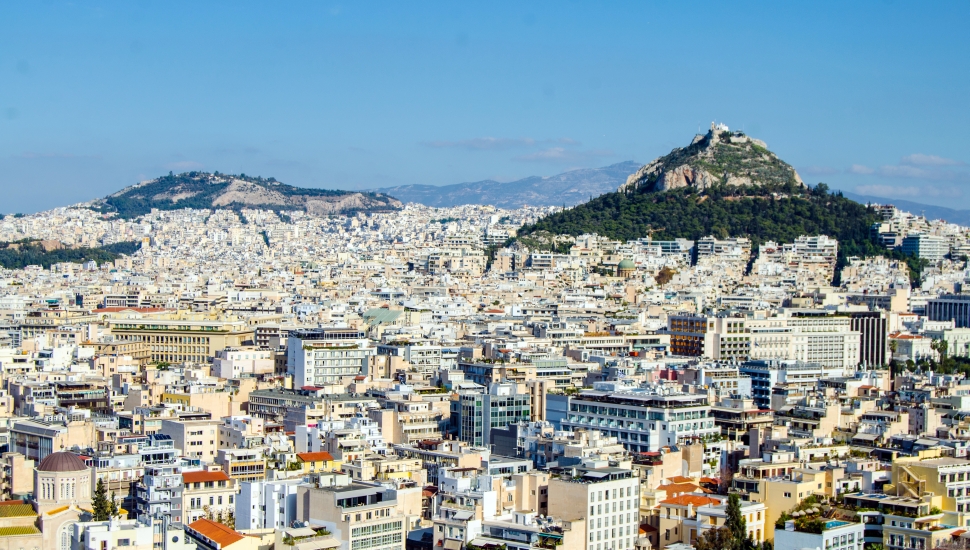Athens Guide: An Ancient World in a Modern Metropolis
Touch down in the chaotic Greek capital and immerse yourself in 3,000 years of history. After exploring the crumbling grandeur of the Acropolis and the Temple of Olympian Zeus, slow down and enjoy the city's relaxed vibe, tremendous food and welcoming locals. It's exactly what the ‘cradle of civilisation' was meant to be…
For a city with more than 3,000 years of history, it's no surprise that Athenians have taken recent economic challenges in their stride. True, swingeing austerity measures have had an impact on the populace, but the Greek character remains unchanged: relaxed, fun-loving and fiercely proud of the nation's remarkable past.
For Greece - and Athens more specifically - is regarded as the birthplace of democracy. As such, Athens is a treasure trove of monuments, not least of which is the Acropolis, dominating the skyline and visible from almost every corner of the capital.
The Acropolis
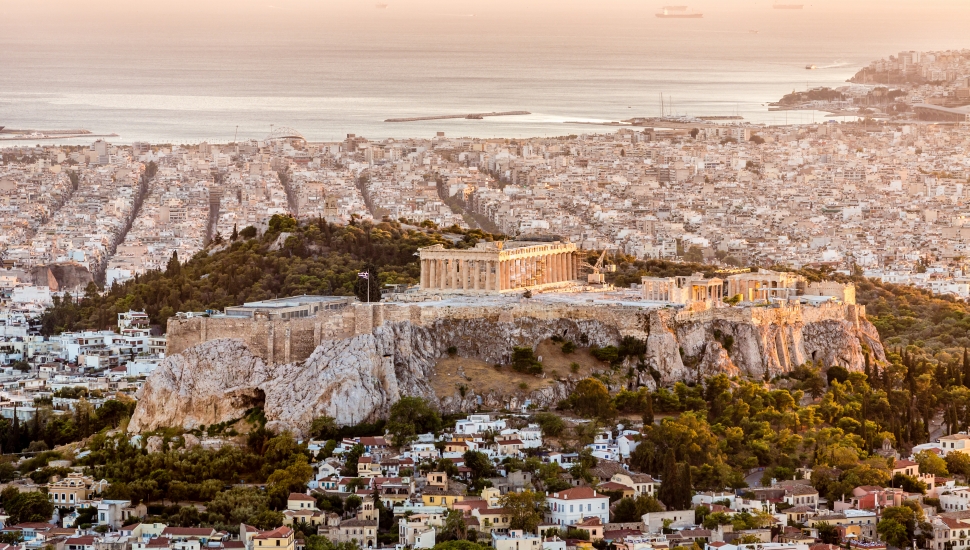
"Acropolis" comes from Greek words ἄκρον (akron, "highest point") and πόλις (polis, "city") and has been the centre of cultural and religious Athenian life since the fifth century BC.
Parthenon
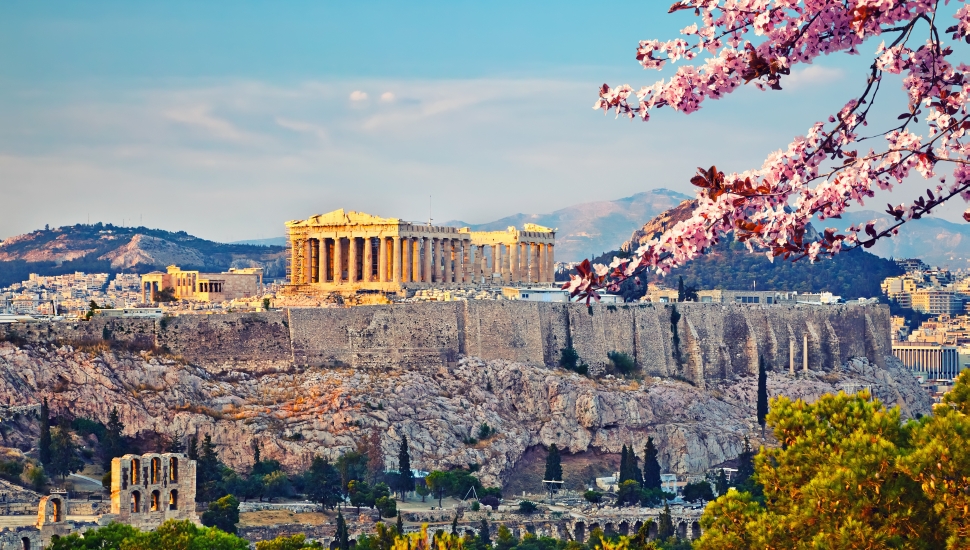
While the Acropolis citadel contains many important historical buildings, the Parthenon is the most famous. This iconic temple epitomises the glory of ancient Greece, and was inspired by Athena Parthenos, the goddess embodying the majesty and power of the city. It took 15 years to build and is the only Doric temple constructed entirely of white Pentelic marble.
The Erechtheum
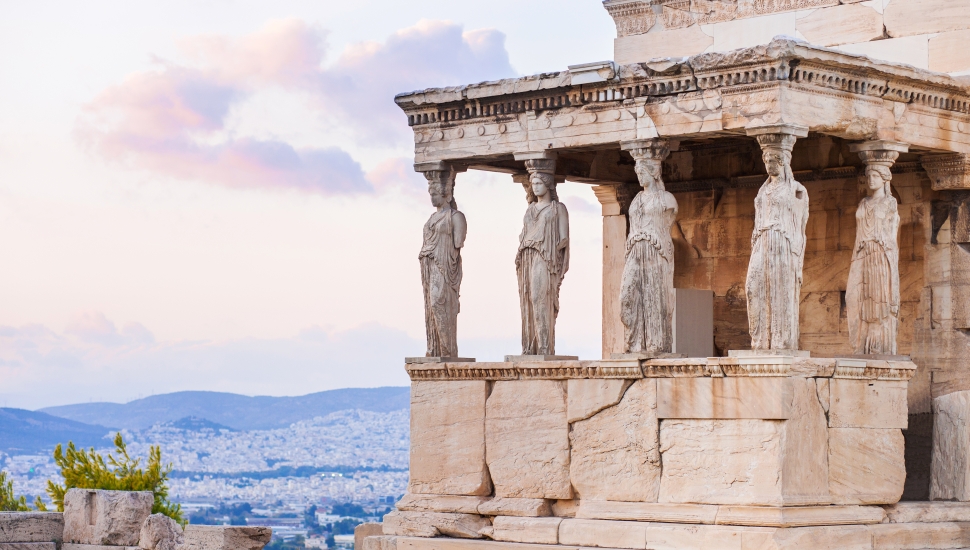
Another must-see temple in the Acropolis, the Erechtheum is dedicated to both Athena and Poseidon and is famed for The Porch of the Caryatids, located on the temple's north side. The pillars take the form of six maidens. Such female-shaped pillars are known as 'caryatids'.
Visiting the Acropolis - tips
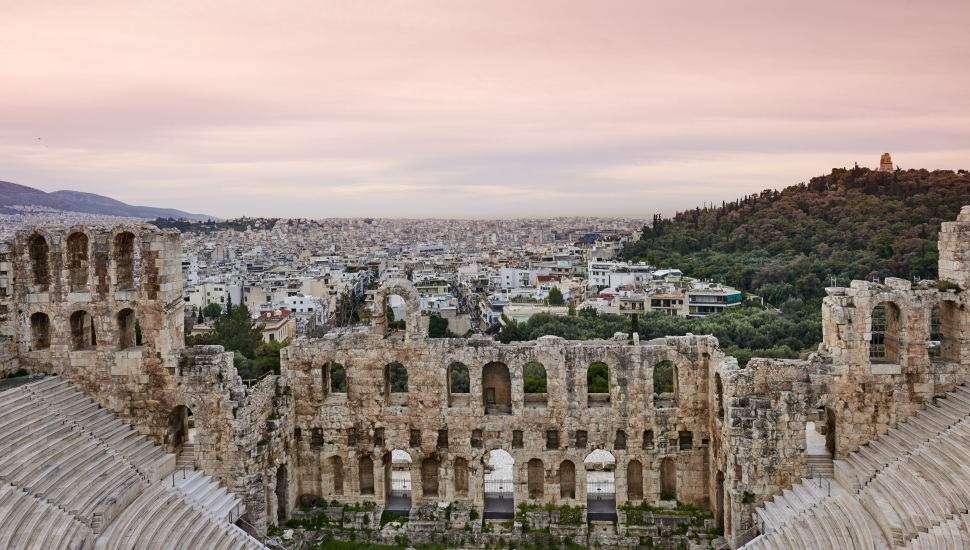
The cradle of democracy is, understandably, a popular place. To beat the sizeable queues, arrive at 8am, when it opens (most visitors appear around 9am). Alternatively, turn up at 6pm when most people have left; you will have until 8pm to explore the ruins in relative peace.
Access to the north and south slopes of the Acropolis costs 20 euros per person in high season, reduced to 10 euros between 1 November and 31 March.
Odeon of Herodes Atticus
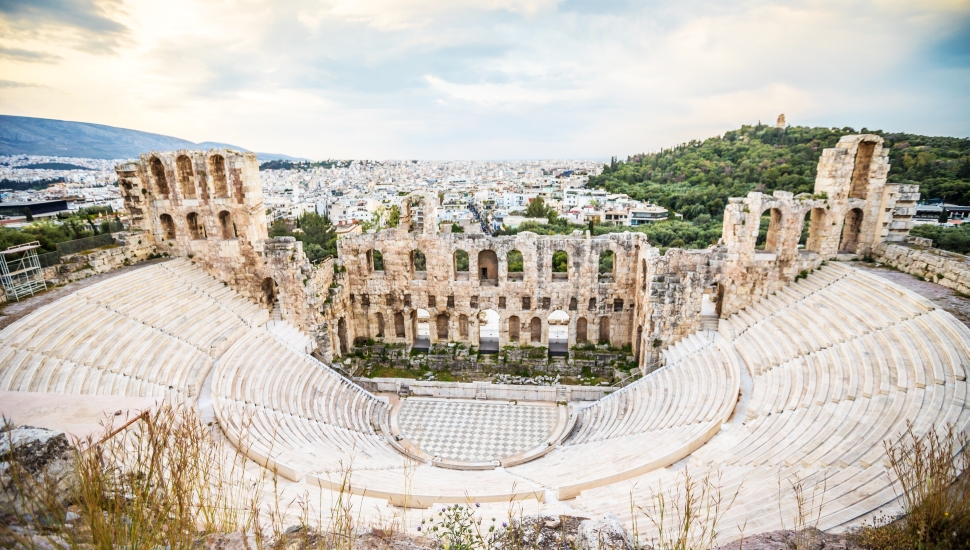
Not far from the Acropolis is the Odeon of Herodes Atticus, a large amphitheatre built by its namesake for his deceased wife Regilla. It was completed in AD 161, but fell into ruin before being excavated in the 19th Century and fully restored in the 1950s.
Benaki Museum
Arguably Greece's finest museum, the Benaki showcases a dazzling array of treasures from the Bronze Age up to Word War Two. Gaze in awe at entire wooden-carved sitting rooms from Macedonian mansions; ravishing Byzantine icons; and a vast collection of costumes from across Greece.
Museum of Islamic Art
A 20 euro ticket for Benaki includes access to the Museum of Islamic Art, one of the finest collections of Islamic weaving, jewellery and porcelain in the world. It is modestly-sized but designed to maximise the visual allure of its artefacts.
Temple of Olympian Zeus
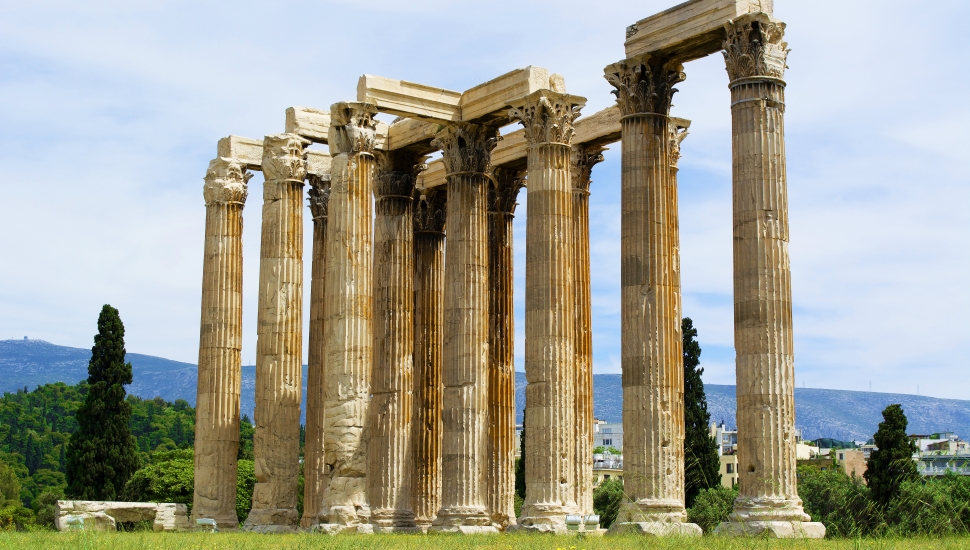
Located in the heart of Athens, the Temple of Olympian Zeus is hard to miss. Originally featuring 104 Corinthian columns, it now boasts a mere 15 - and yet remains the largest temple in Greece. Peisistratos started construction in the 6th century BC, but abandoned the project after running out of cash. A number of others tried to complete it, but it was Hadrian who finally managed it - 700 years after the first stones were laid. Not known for his modesty, the triumphant emperor built a very big statue of Zeus in the cella - and a similarly-sized one of himself.
Byzantine & Christian Museum
Charting the absorbing shift from ancient traditions to Christian ones, the Byzantine & Christian Museum is enjoyed chronologically. At first glance the museum looks somewhat underwhelming, but as you explore the underground exhibition halls, you soon realise just how vast the museum is. After taking in all that history, relax in the delightful café located in the gardens outside.
Eating in Athens

Whether breakfast, lunch or dinner, Athenians take food very seriously. While the charming Plaka neighbourhood appeals to many, the tourist-focussed menus can disappoint. To experience better, more contemporary Greek cuisine, make a beeline for the city centre, where a wide choice of excellent 'modern tavernas' are located.
Varoulko Seaside
Fetching views of yachts and fishing boats bobbing in Mikrolimano Bay make Varoulko Seaside an attraction in itself. But most patrons come here for the exquisite seafood - among which delights include grilled squid with black eyed beans and marjoram; and red mullet fillets in a lemon sauce. Run by Lefteris Lazarou, this Michelin-starred eatery offers some tantalising but pricey dinner options. For a less costly meal, head here for lunch.
Aleria
Hop over to the increasingly trendy Metaxourgio district, where Aleria is located in a wonderful neoclassical building. Opt for duck with wild berries, celeriac puree, caramelized shallots and roast turnip; or perhaps crayfish with sorrel and pink grapefruit. Two tasting menus are available, one of which is vegetarian. Two people dining won't get much change from 150 euros, but the 'bring your own wine' policy can limit the wallet damage.
Where to stay
Hotel Grande Bretagne
One of the world's finest hotels, "the GB" is located in a corner of Syntagma Square, overlooking the Parliament and the changing of the guard. This is where Hollywood A-listers stay - and it is priced accordingly (£275+).
Athenstyle - boutique hostel
In contrast to "The GB", Athenstyle offers dormitory beds for a mere £15. Enjoy splendid views from the rooftop bar and restaurant, where the happy hour presents a great opportunity to meet fellow travellers.
https://athenstyle.com/en_GB/dorms/
Philippos Hotel
A wonderful midway point between a 5-star and backpacker hostel, the Philippos Hotel is family-friendly and just a 10-minute walk from the Acropolis. Around £60 for a double.
https://www.philipposhotel.gr/en/
Things to be aware of
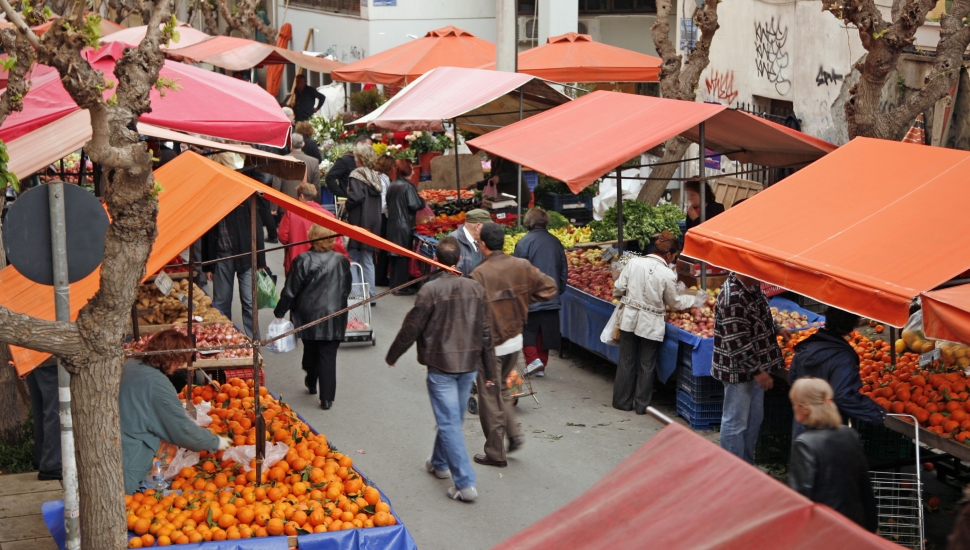
Pickpockets
Athens is home to a number of pickpockets, many of whom operate on the underground Metro system. The line between Athens International Airport is popular with thieves on the lookout for newly-arrived tourists. Passports are often stolen. Alternative transport options include taxis and, for those on a budget, buses.
Strikes
Strikes have been a common feature of Athenian life for the last decade, but the sight of a strike or protest shouldn't be cause for concern. However, as the FCO warns: "You should avoid all demonstrations and follow the advice given by local security authorities."
Rowdiness/drunkenness
Greek police take a very dim view of indecent or excessively drunken behaviour. As the FCO says: "Greek courts impose heavy fines or prison sentences on people who behave indecently. Your travel insurance may not cover you after drinking."
3,000 years in the making
Despite the country's ongoing economic challenges, tourists keep coming to Greece - and to its unique capital. Indeed, five million tourists arrived in Athens in 2017 - setting a new record. The alluring combination of world-beating historic sites, life-affirming food, genial locals and low prices make Greece's ancient capital hard to resist.
Get a Quote